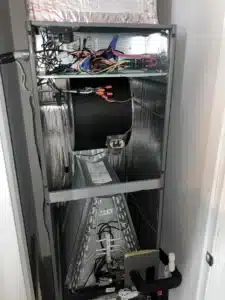The Importance of Coil Cleaning for Florida HVAC Systems
Florida HVAC systems work harder than those in almost any...
Indoor Air Quality (IAQ) is a critical factor that often goes unnoticed but profoundly impacts the well-being of occupants within a home or office. In this article, we’ll explore the factual reasons why Indoor Air Quality is of utmost importance, shedding light on the tangible benefits of maintaining a healthy and clean indoor environment.
Poor Indoor Air Quality can have direct consequences on respiratory health. Dust, allergens, and pollutants circulating in the air can exacerbate allergies, trigger asthma symptoms, and lead to respiratory infections. Maintaining high IAQ is particularly crucial for vulnerable individuals, including children, the elderly, and those with pre-existing respiratory conditions.
Indoor spaces can harbor a variety of allergens, including dust mites, pet dander, and mold spores. These allergens can contribute to allergic reactions and respiratory discomfort. Adequate ventilation, proper filtration, and regular cleaning are essential measures to reduce allergen exposure and create a healthier living environment.
Good Indoor Air Quality is not only about health but also about comfort and productivity. Poor air quality can lead to symptoms such as headaches, fatigue, and difficulty concentrating. A clean and well-ventilated indoor environment supports overall well-being, creating a more comfortable and conducive space for work or relaxation.
Long-term exposure to indoor air pollutants has been linked to various health issues, including respiratory diseases, heart problems, and even certain cancers. Prioritizing IAQ is a proactive approach to preventing these health issues and maintaining a healthier lifestyle.
Indoor spaces often contain Volatile Organic Compounds (VOCs) emitted by household products, paints, and cleaning chemicals. Prolonged exposure to VOCs can have adverse health effects. Adequate ventilation, proper air circulation, and the use of air purifiers with activated carbon filters can help effectively remove VOCs from indoor air.
Excessive moisture in indoor spaces can lead to mold growth, posing both health and structural risks. Mold spores in the air can cause respiratory issues and allergies. Proper ventilation, moisture control, and prompt remediation of water leaks or damage are essential for preventing and addressing mold-related concerns.
The efficiency of your HVAC system is closely tied to Indoor Air Quality. Regular maintenance of HVAC components, including air filters, coils, and ductwork, ensures that the system operates effectively in filtering and distributing clean air throughout your home or office.
A well-maintained indoor environment acts as a barrier against airborne pathogens, including viruses and bacteria. Proper ventilation, air filtration, and regular cleaning help reduce the risk of airborne transmission of illnesses, contributing to a healthier living and working space.
Indoor pollutants, such as particulate matter and gases, can accelerate the deterioration of household items, including furniture, electronics, and textiles. Maintaining good IAQ not only benefits human health but also helps preserve the longevity and condition of personal belongings.
Prioritizing Indoor Air Quality aligns with environmental responsibility. Energy-efficient HVAC systems and eco-friendly practices contribute to sustainability efforts, reducing the environmental impact of indoor air management.
The importance of Indoor Air Quality extends beyond mere comfort—it is a fundamental component of a healthy and sustainable living environment. By understanding the tangible benefits of maintaining clean and pollutant-free indoor air, homeowners and businesses can take proactive steps to ensure the well-being of occupants and create spaces that promote health, productivity, and overall quality of life.

Florida HVAC systems work harder than those in almost any...

Indoor air quality plays a major role in how a...

Ventilation is one of the most important yet often overlooked...

In Florida, air conditioning is not a luxury. It is...

Many homeowners assume that central air conditioners pull fresh air...

Preventive AC maintenance plays a major role in keeping cooling...